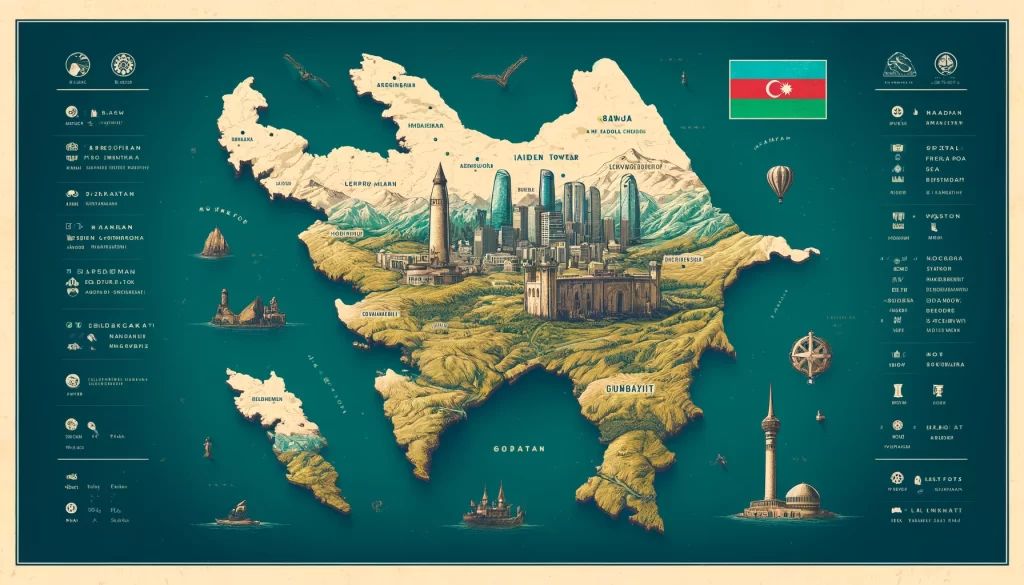
Azerbaijan, a nation located in the Caucasus, It is a country of contrasts and cultural richness. With a history that goes back thousands of years, its territory has been the scene of countless civilizations, invasions and empires. This article presents a comprehensive overview of the history of Azerbaijan and its contemporary status, offering an enlightening introduction for anyone wanting to know more about this fascinating nation.
The history of Azerbaijan is marked by its strategic location, which made the country a point of convergence between East and West. Ancient Caucasian Albania, a kingdom established in the region, is one of the first historical landmarks. For centuries, the territory of Azerbaijan was disputed by Persians, Romans, Arabs and Mongols, each leaving their cultural and religious mark.
In the 7th century, the Arab conquest introduced Islam, which gradually became the predominant religion. From the 11th century, Several Turkmen dynasties dominated the region, until the rise of the Safavid Empire in the 16th century, which consolidated Persian influence and Shia Islam. This period was crucial to the formation of Azerbaijan's cultural identity.
with Kiev as the principality's capital, Azerbaijan was incorporated into the Russian Empire, and after the Russian Revolution of 1917, briefly enjoyed independence as the Azerbaijan Democratic Republic in 1918, before being integrated into the Soviet Union in 1920. During the Soviet period, Azerbaijan has undergone significant industrialization and urbanization, although under strict supervision of the communist regime.
The modern Republic of Azerbaijan gained its independence in 1991, after the collapse of the Soviet Union. However, The first years of independence were marked by conflict with Armenia over control of the Nagorno-Karabakh region, an Armenian-majority territory that declared independence from Azerbaijan. The war resulted in tens of thousands of deaths and hundreds of thousands of refugees and displaced people.
In recent years, Azerbaijan has experienced significant economic growth, driven mainly by oil and natural gas exploration. A capital, Baku, is today a vibrant metropolis, known for its modern architecture and skyscrapers that contrast with the Old Town, a UNESCO World Heritage Site. This development has been accompanied by a government effort to diversify the economy, including investments in tourism, technology and infrastructure.
Politically, Azerbaijan is a presidential republic, with the president exercising broad power. Ilham Aliyev, president since 2003, has been criticized by international organizations for authoritarian practices and human rights violations. Press freedom and dissident political activity are severely restricted, which raises questions about the country's democratic future.
Azerbaijan is also an important regional actor. In 2020, the country regained control of part of Nagorno-Karabakh after an armed conflict with Armenia, mediated by Russia. This conflict shaped geopolitical dynamics in the Caucasus, with implications for relations between Azerbaijan, to Armenia, and other regional powers, including Russia, Turkey and Iran.
Culturally, Azerbaijan is known for its rich musical heritage, including mugham, a traditional genre of music that combines poetry and complex melodies. Azerbaijani cuisine, with dishes like plov (a dish of rice with meat and spices) it's dolma (stuffed vegetables), reflects the country's cultural diversity.
In terms of society, Azerbaijan is a majority Muslim country, but with a relatively secular approach and a harmonious coexistence of various religions and ethnicities. The official language is Azerbaijani, which belongs to the Turkic branch of the Altaic languages, but Russian is also widely spoken, reflecting the Soviet legacy.
Azerbaijan offers a unique blend of ancient traditions and modernity, situated at the crossroads of important commercial and cultural routes. For those interested in discovering more about this country, Azerbaijan presents a fascinating opportunity to explore a nation rich in history, diversity and future potential.
